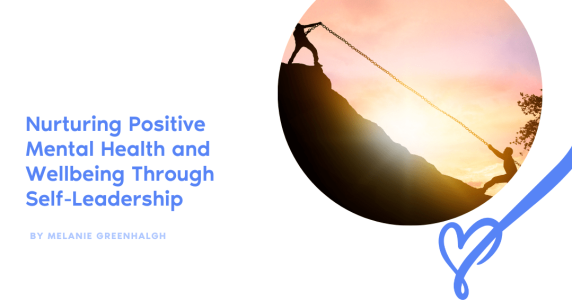In the fast-paced and demanding world we live in, maintaining positive mental health and wellbeing has become increasingly crucial. While external factors play a significant role, our own self-leadership abilities can be a powerful catalyst for promoting and sustaining our mental health. By cultivating self-awareness, self-care, and resilience, we can enhance our overall wellbeing and create a positive ripple effect in our lives and the communities we are part of.
What is Self-Leadership?
Self-leadership provides a framework for understanding and nurturing our inner motivation and drive. At its core, self-leadership refers to the ability to take charge of one’s own thoughts, emotions, and actions in a way that aligns with personal values and goals.
Developed by two educational behaviourists Deci and Ryan, it involves cultivating self-awareness, setting meaningful objectives, and actively engaging in behaviours that support growth and wellbeing. By adopting a proactive and intentional approach to guiding ourselves, self-leadership empowers individuals to take ownership of their lives, make choices that align with their authentic selves, and ultimately enhance their overall sense of fulfillment and success.
How can we bring self-leadership into our daily lives?
1. Embracing Self-Awareness:
Self-awareness forms the foundation of self-leadership and is essential for understanding our thoughts, emotions, and behaviours. By developing self-awareness, we gain insight into our triggers, strengths, and areas for growth. This understanding empowers us to make conscious choices and respond thoughtfully to challenging situations. Engaging in conversations with ourselves, tuning in and doing self-reflection exercises, such as journaling or meditation, allows us to see and hear the thoughts impacting our lived experiences, develop a deeper connection with ourselves and build a solid platform for positive mental health.
2. Look after ourselves:
While it can feel like a buzz word at times – self-care is an integral part of self-leadership and directly impacts our mental health and wellbeing. It involves prioritising our physical, emotional, and spiritual needs, ensuring we nurture ourselves holistically. Engaging in small, easy to achieve activities that bring us joy and relaxation, such as a quiet cup of tea, hobbies, exercise, or spending time in nature, replenishes our energy and reduces stress. By consciously bringing moments of self-care into our daily lives, we send a powerful message to ourselves that we are deserving of love and attention, fostering a positive mindset and promoting emotional balance.
3. Cultivating Resilience:
Resilience is the ability to adapt and come back from adversity, and it plays a crucial role in maintaining positive mental health. Developing resilience through self-leadership involves adopting a growth mindset and understanding that the challenges we face are the place where we grow and learn the most. By processing our emotions and reframing setbacks as learning experiences, we build our capacity to overcome obstacles and maintain a positive outlook. Nurturing resilience also involves fostering a strong support system, seeking guidance when needed, and finding healthy coping mechanisms to manage stress effectively.
4. Seeking Connection:
While self-leadership focuses on individual growth, it is essential to recognise the power of community and connection in supporting our mental health and wellbeing. Building and maintaining relationships with like-minded people who share similar values and aspirations can provide a sense of belonging and support. Engaging in meaningful conversations, participating in group activities, or joining community organisations allows us to connect with others, share experiences, and cultivate a sense of purpose.
Self-leadership is a powerful tool for nurturing positive mental health and wellbeing. By embracing self-awareness, practicing self-care, cultivating resilience, and seeking connection, we can empower ourselves to create meaningful change. The journey towards positive mental health is not solitary but one that is strengthened by community support.
Sources:
Ben-Shahar, T. (2014). Choose the life you want: The mindful way to happiness. The Experiment.
Deci, E. L., & Ryan, R. M. (1985). Intrinsic motivation and self-determination in human behavior. New York, NY: Plenum.
Ryan, R. M., & Deci, E. L. (2000). Self-determination theory and the facilitation of intrinsic motivation, social development, and well-being. The American Psychologist, 55(1), 68–78.
Fitzgerald, M. (2021). Cool, calm, and collected: The associations between self-leadership and adult mental and relational health outcomes. American Journal of Family Therapy. Advance online publication. https://doi.org/10.1080/01926187.2020.1865218
